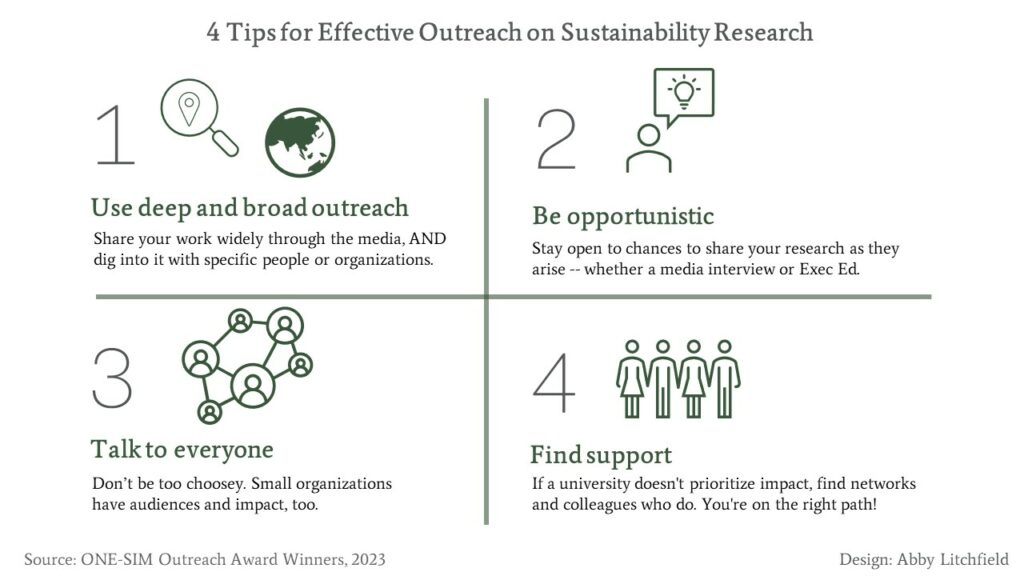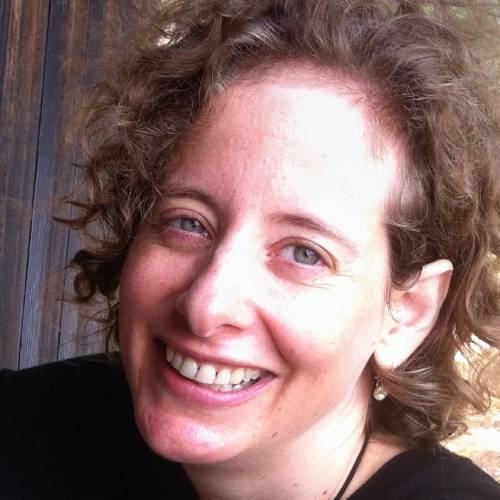Winners of the 2023 ONE-SIM Outreach Award for sustainability research make the case for going deep as well as broad. Communities matter, not just clicks.
When Maggie Cascadden and Emilio Marti began the ONE-SIM Outreach Award in 2020, they kept the definition of “outreach” purposely broad. The award aimed to recognize management researchers working on sustainability who “reach out and communicate their insights to broader audiences.”
“We didn’t want to be too prescriptive about what ‘outreach’ should look like,” explained Marti, an associate professor at the Rotterdam School of Management. “Our main goal was to encourage and support researchers who are trying to have an impact with their findings.”
Over time, it has become clear that researchers don’t just care about making lots of people aware of their research. They care about seeing the findings actually used: about practical implementation.
In 2023, there’s new language for this goal of supporting practical implementation. It comes from the winners of the 2023 Outreach Award, Suntae Kim (John Hopkins University) and Anna Kim (McGill University). They call this focus “deep outreach.” The concept builds on their research on start-up incubators and specifically the idea of “scaling deep.”
Suntae’s and Anna’s Research on “Scaling Up” vs. “Scaling Deep”
Incubators help entrepreneurs develop their businesses. Traditionally, they’ve encouraged new businesses to “scale up,” which means achieving fast growth and expanding geographically. An alternative approach encourages start-ups to “scale deep” by rooting themselves in a specific location for the long term.
Suntae and Anna studied an alternative and a traditional incubator in Detroit for almost a decade. They found that “scaling-up” ventures grew explosively through venture capital but had a limited impact on their home city of Detroit. That’s because they often “failed fast” or, if successful, moved elsewhere.
Businesses that “scaled deep” embedded themselves with Detroit’s existing people, institutions, and structures. They created local jobs and addressed local needs. Their growth was slow but steady.
Scaling up is about marketing a product to the widest possible audience. Scaling deep is about significant change in one area. They create different kinds of value.
Two Types of Outreach for Researchers
It’s possible to apply this kind of thinking to outreach as well.
“Scaling up” is reflected in the broad outreach often undertaken by university media relations departments. It aims to reach a wide audience with the most generally-applicable results. Researchers who take this approach might give interviews to journalists, or write articles for practitioner-focused outlets like Harvard Business Review, Forbes, MIT Sloan Management Review, or the Network for Business Sustainability.
Suntae and Anna also advocate “deep outreach,” parallel to the idea of “scaling deep” in their research. This means working closely with a specific community, organization, or practitioner, and helping to tailor the ideas to their needs. It’s likely a slower, longer process of engagement – and the effects may be more lasting.
Here’s the good news: You don’t have to choose. Suntae and Anna took both approaches and found them to be complementary.
Moving Between Deep and Broad Outreach
Here’s how deep and broad outreach reinforced each other.
Beginning broad: Suntae and Anna wrote an article for Harvard Business Review and did several podcasts. These led to interviews with Forbes and Stanford Social Innovation Review.
The media appearances boiled down the complex messages and thus became a gateway for deeper engagement. “Once our idea was out there, through a channel where a lot of practitioners read it, it led to more opportunities,” said Suntae.
Going deep: As practitioners reached out to Suntae and Anna, conversations and even partnerships developed. “We had direct engagement with practitioners across the globe who are pursuing entrepreneurship-driven local revitalization,” Suntae said. For example, incubator Porter House KC (Kansas City, US) has developed the “Scale Deep Grant” to support underserved local entrepreneurs. The research helped them put their ideas into words, said Anna. “Now they have that vocabulary and ways of doing it.” This fall, Suntae and Anna will lead a workshop there as part of the incubator’s global entrepreneurship week event.
Back to broad outreach: Deeper engagement provided insights that could then shape media interviews. “Our paper has a lot of different elements with a lot of different insights,” Suntae explained. “Through the process of talking with the practitioners, we learned which element of our insights was important for them. And that subsequently shaped our message with the other outlets.
Specifically, he learned that practitioners needed more practical guidance on how to design businesses that would scale deep. That became the topic of a Nonprofit Quarterly article.
More Tips for Research Outreach, from Award Finalists
Here are some additional tips from Suntae and Anna and from Vanessa Burbano (Columbia University), who was a finalist for the 2023 Outreach Award. Burbano studied how company political stances affect employees.
Be Opportunistic in Your Outreach
Don’t worry if you don’t have a formal strategy for outreach. Instead, be open to chance.
“We didn’t have a really perfectly planned out strategy,” said Suntae. “It was more a journey that was full of serendipities and unanticipated opportunities.” That journey began with the initial article for Harvard Business Review, which sparked further opportunities.
Vanessa began by sharing her research with her university’s media team. Then, “I just agreed to these 10 to 15 min calls with basically any journalist who wanted to talk to me about anything remotely related to this topic,” she recalled.
She found another opportunity for outreach in Executive Education sessions. “They always want to hear about what your research is about,” she noted. “Sometimes chatting with executives on breaks, where I would otherwise be sipping coffee and making small talk, will turn into an interesting research conversation where people make a connection to their work.” Such interactions come about naturally and take little time, said Vanessa.
Talk to Everyone
Many of us know an academic who says, “I’ll only give an interview to the New York Times.” But Suntae, Anna, and Vanessa took a broader approach, speaking with most who approached them.
“No matter how big or small the audience was, I don’t think we see any of our sharing as less successful than other efforts,” said Anna. “Because ultimately, we were able to share what we learned with people who found it useful.”
For Suntae and Anna, an open approach connected to the spirit of their research. Their study found that not only high-value start-ups matter in the entrepreneurship world. Similarly, in outreach, “It’s not just HBR and Forbes and the big names that count.”
Ironically, smaller outlets can lead to accessing bigger outlets. “Journalists read each other,” Vanessa noted. “I spoke with either the Financial Times or the New York Times at one point, and they said, ‘We read this piece about this topic in a less well-known outlet.’”
Find Support, Despite Obstacles
Universities don’t always support outreach, whether deep or broad. “Many academic-oriented, research-focused business schools don’t really count if you publish a paper in a practitioner outlet,” said Suntae. “They don’t really appreciate if you spend too much time talking with the practitioners.”
But it’s possible to find encouragement in other places. These include:
-
Sense of personal mission. “I strongly believe everyone has to have their own true North in our field,” said Vanessa. “I actually love our career and find it meaningful, but I have my own sense about what’s important to me. I want to do good research, but I also want to make an impact.”
-
Colleagues and networks. “In my academic journey, I have found multiple communities where these kinds of activities are appreciated and understood as important,” said Anna. For example, the Impact Scholar Community invited her to speak on a panel about engagement: “I felt a lot of appreciation and love, and that really helps me stay motivated.”
-
The work itself. The engagement “really energized me,” said Suntae. “The feedback that I got from all these outreach activities, gave me confidence, it gave me the feeling that I’m on the right path.”
About the 2023 Outreach Award Finalists
Suntae Kim (Johns Hopkins University) and Anna Kim (McGill University) won the award for outreach activities based on the paper “Going viral or growing like an oak tree? Towards sustainable local development through entrepreneurship” (Academy of Management Journal, 2022)
The jury was impressed by “how the authors translated nuanced and multilayered ethnographic findings about the most effective methods of incubating new businesses into actionable insights for the business community, policymakers and nonprofits, and the broader public.”
This video provides further insights into Suntae’s and Anna’s outreach activities.
Vanessa C. Burbano (Columbia University) was chosen as a finalist for outreach activities based on the paper “The demotivating effects of communicating a social-political stance: Field experimental evidence from an online labor market platform” (Management Science, 2021)
The jury was impressed by “how the author was highly effective in getting topic insights about the benefits and hazards of corporate political activism into a wide array of top media outlets that can impact practical action.”
This video provides further insights into Vanessa’s outreach activities.
About the ONE-SIM Outreach Award
The ONE-SIM Outreach Award is sponsored by the Academy of Management’s Organizations and the Natural Environment (ONE) and Social Issues in Management (SIM) Divisions, with support from the Network for Business Sustainability and Rotterdam School of Management.
The award is given annually and the deadline is April 30 each year. Find out about past winners and consider applying!
And see the 2022 award finalists’ “6 Tips for Effective Outreach on Sustainability Research.”




Add a Comment
This site uses User Verification plugin to reduce spam. See how your comment data is processed.This site uses User Verification plugin to reduce spam. See how your comment data is processed.